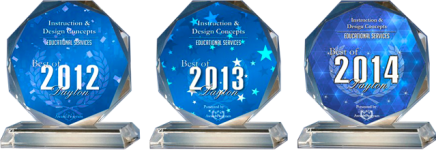
ANOTHER MAJOR AWARD!
As we wind down the fall competitive seasons with numerous trophies, plaques, ribbons, and medals being passed out for all kinds of rankings, ratings, and awards, I found it funny that even our little micro-enterprise received “a major award.”
In fact, for the third year in a row (Hey! a three-peat!) our company Instruction & Design Concepts was awarded the “Best of Dayton Awards for Educational Services.” Now, before you’re too impressed you might want to consider the source of these awards over the years.
The first two years…

SOURCE: Google Maps
The third year…

SOURCE: Google Maps
Now, to be clear I’m significantly cynical and yet a bit concerned about even acknowledging this “award” simply to make a point. Here’s why: Some people won’t ever read this! They’ll just see the picture of the awards and send us an unaware note, comment or email of congratulations. There was no application process, no adjudication process, no recommendation process, just the award. According to the web site, “The Award Program is an annual awards program honoring the achievements and accomplishments of local businesses throughout the area.” Really?! “Recognition is given to those companies that have shown the ability to use their best practices and implemented programs to generate competitive advantages and long-term value.” Best practices?! WOW! Now, the crystal award, plaque, or both cost between $79.99 and $199.98 depending on if you want to include the complimentary digital-award image and personalized press release. We decided to pass knowing (as they say) “it was an honor just to be nominated.”
Do people really buy these? I wonder if the over-emphasis on results, scores, and rankings builds an expectation of excellence that isn’t… well… really excellent? It just looks like you’re excellent. “See! We’ve got these fancy awards!” The good people at awardservice.org have no idea who we are, what we do, or how we serve the organizations we work with. The don’t care as long as we send in our order.
Perhaps I’m a bit jaded about trophies, plaques, ribbons. medals and awards because I grew up with a grandfather who owned a sporting-goods store: Kick’s Athletic Goods. We’d get to go to grandpa’s store and help build the trophies. Once he even let us build our own little trophy to take home with us. The six-inch, faux-marble, gold-plastic figurine-topped award even had my name engraved on a brass plate! Nice and shiny too.
As you see all the hardware handed out following some end-of-season championship event this fall, just remember that the trophy, plaque, medal, or ribbon is simply a symbol that represents the culmination of a process. It’s like a snapshot of some moment in time. Shared to remind you of what you did, not what you won. Acknowledging the process you pursued, not just the result you achieved. Yet too many times it’s the trophy that earns the praise of others, not the trial and tribulations of constantly improving what we do and how we do it.
Carol Dweck, Professor of Psychology at Stanford University in California, conducted dozens of studies about praise’s impact on students’ self-esteem and their academic achievement. She states that students would be better served long-term if we offered “praise for the process the child engages in—their hard work, trying many strategies, their focus, their perseverance, their use of errors to learn, their improvement.”
That doesn’t mean trophies, plaques, ribbons. medals and major awards are bad. They’re a sincere token of appreciation, a memento of celebration, and an exclamation of recognition. Just don’t let their glistening shine overshadow the real reason we come together to complete against ourselves first, and each other second. To challenge ourselves first, and each other second. To compare ourselves to “our best” first, and to others second. Because from first place to last place, we need to sincerely appreciate what we do and how we do it—regardless of circumstances—to continuously improve how we do what we do. Otherwise, our intrinsic motivation will be punished by rewards.
The word ‘compete’ comes from the Latin word ‘competere’ which means to meet, to come together, to agree. The Latin root com- meaning with or together and petere meaning to seek or strive toward. In later Latin, the word developed the sense of to strive together or to strive in common which was the basis for the English word competition.
—Online Etymology Dictionary and the Oxford Latin Dictionary
Always looking for real-world examples that illustrate how to balance nurturing more intrinsic motivation without over-emphasizing extrinsic rewards, here’s one to start you thinking. Dr. Tim Allshouse, is the Director of Bands at Blue Springs High School in Missouri.
UPDATE: Looks like after a 5-year hiatus, Instruction & Design Concepts is once again considered the “Best of Dayton for Educational Services!” Must be the new website.

